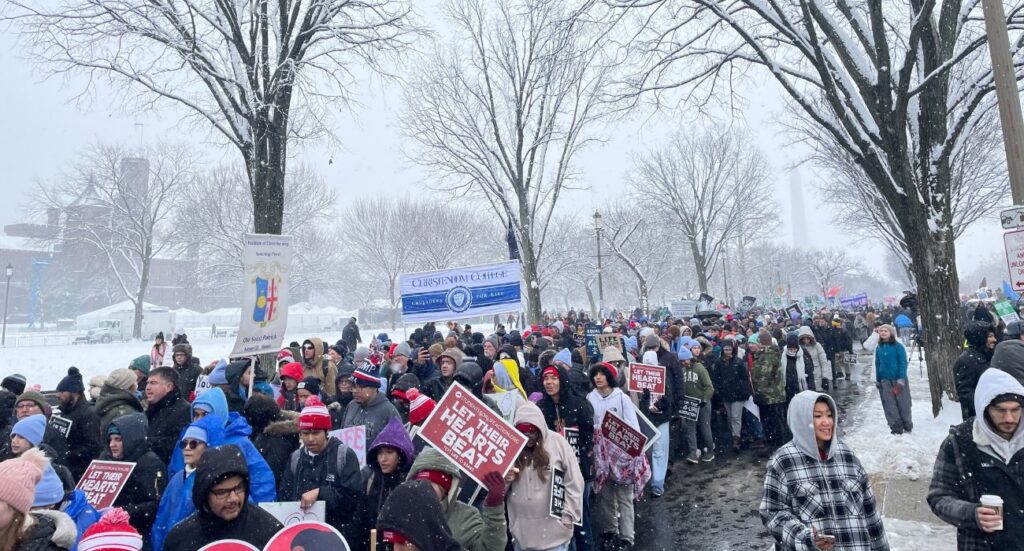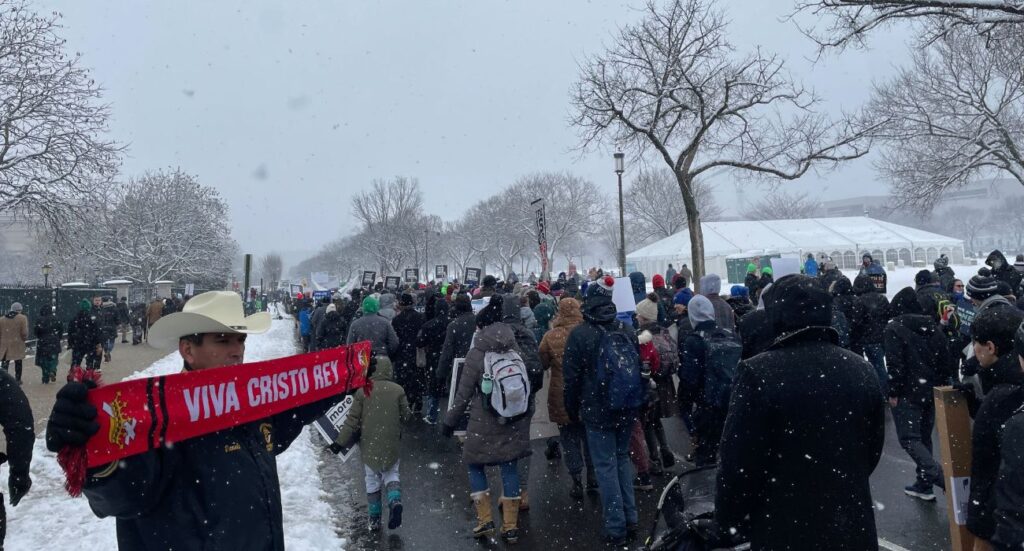WASHINGTON, D.C. — Anti-Abortion activists traveled to the nation’s capital on a snowy Friday to participate in the 51st annual March for Life, which included speeches from movement leaders like House Speaker Mike Johnson and Michigan football coach and national champion Jim Harbaugh.
Paul Gassman traveled from Newark, Ohio, to attend the March for Life for the 25th time. The unity on display at the march, he said, brings him great joy each year.
“For those of us who work in the ministry, it’s extremely uplifting to see the numbers of people who are on the side of life and respect life in all states, from conception to natural death,” said Gassman, who works at a pregnancy center in his community.
“It’s about saving the babies, about saving the mothers, about saving the culture, honestly. We live in what is oftentimes considered a culture of death,” he told The Dallas Express.

The event on Friday marked the second March for Life since the overturning of Roe v. Wade. Jeanne Mancini, the president of March for Life, said she expects to see electoral success from anti-abortion legislators this year.
“What we’ve seen is that elected officials who have a great understanding of this and lean into it with a lot of joy and confidence, they’ve won,” Mancini told The Dallas Express. “It’s when they’re sort of nominally pro-life and bury their head in the sand that they’re losing. When it comes to candidates, it’s more about being confident and leaning into this issue and being on the right side of the most important human rights issue today.”
Harbaugh spoke briefly at the March for Life as he introduced former NFL player Benjamin Watson.
“It’s a great day for a march,” Harbaugh said. “This is football weather!”
Watson, the author of The New Fight for Life: Roe, Race, and a Pro-Life Commitment to Justice, said men should never back away from the abortion issue.
“Men are involved in this regardless of what anyone says,” Watson told The Dallas Express. “You have a place in this, you have a role in this, not only that, you have a calling to fatherhood.”
“It’s important for men to fight against the passivity,” he continued. “Often as men, myself included, we give in to being passive, to allowing things to happen, to be self-protected, to not challenging ourselves.”

Rose Romero, a resident of Fort Worth, Texas, traveled to Washington, D.C. for her second March for Life. She said she was grateful to live in a state that “respects life,” citing the state’s abortion ban.
“I feel blessed, lucky, absolutely,” Romero told The Dallas Express. “It’s the right thing to do, clearly. Who wouldn’t want to save babies? Who could not want a baby to live for goodness sake?”
Michelle West, a mother of eight, traveled from Atlanta for her first March for Life. She said she wants legislators in Washington, D.C. to know the unborn are supported and loved.
“Remember that every voice counts and that we are here representing those who do not have an opportunity to voice their right to life,” West told The Dallas Express. “Without a right to life, no other rights matter.”
Christina Parker, 18, traveled from Sidney, Maine. Abortion is a top issue for her, she said, as she prepares to vote in her first presidential election.
“A lot of times with the abortion conversation, they’re saying we need abortion for young folks who maybe are raped or maybe in a situation where they don’t want the baby,” Parker told The Dallas Express. “I’m 18 years old, a young woman, and I don’t need an abortion to be successful. But that’s what they’re telling us, that we can’t have a successful career, we can’t go to college unless we have things like abortion, but that’s just not the case.”

Although there did not appear to be any pro-abortion advocates counter-protesting at Friday’s march, many did make their voices heard in the weeks and months surrounding the Supreme Court’s overturn of Roe v. Wade.
“Reproductive rights, including the right to access abortion, are grounded in internationally recognized human rights,” the left-wing group Human Rights Watch (HRW) wrote in June 2022.
“Guaranteeing access to abortion is not only a public health imperative, it is a human rights imperative as well,” stated Macarena Saez, the women’s rights director at HRW. “Though more governments are taking steps to increase access to abortion, others are impeding or outright banning it, putting the rights of women, girls, and pregnant people at risk.”
HRW claims that banning or restricting abortion does not lower abortion rates but instead increases the risk of unsafe procedures, especially affecting “people living in poverty or who are otherwise subject to systemic discrimination.”


